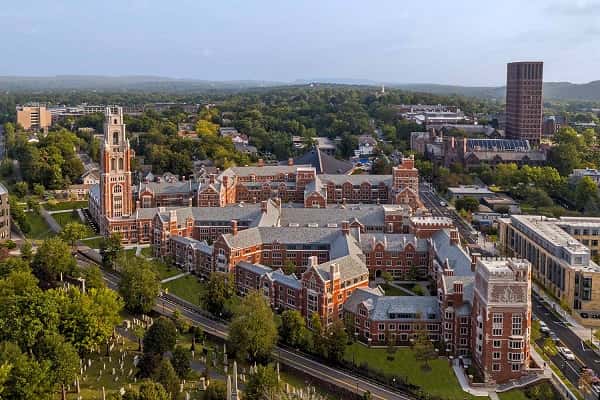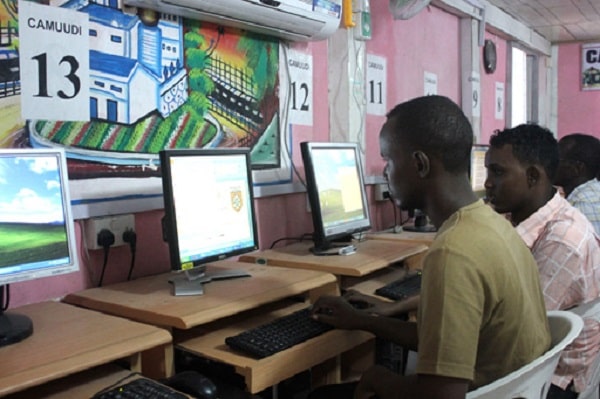The 10 best universities in Argentina [Updated]
History, present and future are combined in the reality of the best universities in Argentina. These are institutions that have an important track record behind them and that, in turn, constantly work to update their proposals and prepare their students for the coming decades.
The most prestigious study houses in the country are recognized by the Ministry of Education and grant official degrees. All of them stand out for the number of undergraduate and postgraduate courses they offer and for teaching classes both in person and remotely.
In Argentina, public universities with free access coexist with private universities that charge for their educational services. In both groups, we can find entities that are highly valued and recognized even internationally thanks to their academic work and their contributions in the field of research.
![The 10 best universities in Argentina [Updated]](https://naijaxtreme.com/wp-content/uploads/2022/06/best-universities-in-argentina-img_1-min.jpg)
The best Argentine universities not only aim for excellence in terms of the training of their students. They also offer multiple extracurricular activities and carry out different tasks together with the community.
It is interesting to note that there are university centers that specialize in formal sciences and others in social sciences or natural sciences. That is why there are those who choose their university based on the career to be followed, taking into account the reputation in each case.
Read Also: TOP 3 Most Prestigious Universities in California
The University of Buenos Aires, the National University of La Plata, the Argentine Catholic University and the University of Palermo, among other establishments, are part of the higher-level educational offer in Argentina. Each one has its strengths to captivate those who aspire to graduate and become successful professionals in their field of action.
Top 10 best universities in Argentina
1. National University of Cordoba
There are concrete data that show the relevance of the National University of Córdoba in the educational field. The institution has an area of 11.5 million square meters distributed between the city of Córdoba and towns in the interior of the province. Nearly 136,000 students are trained in it, who attend fifteen faculties and two secondary schools.
The UNC also has 145 institutes and research centers, seventeen museums, twenty-five libraries, two astronomical observatories, two hospitals, two radio stations, two TV channels and a nature reserve. All numbers that reflect the impact that this entity founded in 1613 has on the community.
Five Argentine presidents studied at UNC, whose Virtual Campus is widely recognized for the variety and quality of its courses and online classes. It should be noted that the university offers the possibility of applying for scholarships, either for undergraduate courses, postdoctoral training or research work.
2. University of Buenos Aires
With almost two centuries of history, the University of Buenos Aires is the highest emblem of higher education in Argentina. It was founded in 1821 and is often mentioned as one of the most prestigious study houses in Latin America.
More than a dozen Argentine presidents studied at the UBA. The five Argentines who managed to win a Nobel Prize, meanwhile, studied or worked as teachers at the institution. All a sample of its relevance for the country.
Upon entering the UBA, students take the Common Basic Cycle (CBC). This instance was created in 1985 to guide the student, favor the consolidation of learning methodologies and guarantee interdisciplinary, comprehensive and basic training for all.
With thirteen faculties and dozens of degree courses, the UBA offers numerous training options. Thousands of graduates, students and professors do not hesitate to affirm that it is one of the best universities in Argentina and the continent.
3. National University of the Coast
In 1919, the history of the National University of the Coast began. A house of studies that today has a dozen faculties, two university centers, a higher institute and four schools (one Middle Level and one Primary Level and Initial Garden).
Its Distance Education Program is already more than two decades old. In this way, the UNL has been promoting access to quality education without geographical or physical limits.
Academic training is not the only action of the UNL. With more than 1,700 researchers working in different laboratories, institutes and its own centres, the entity is one of the great protagonists of scientific and technological development in Argentina.
The cultural and social extension programs of the UNL, on the other hand, allow problems that affect society to be addressed from the university sphere. Foods of Social Interest, Equity in Health and History and Memory are some of the programs that promote the articulation of teaching and research and contemplate different types of activities.
4. National Technological University
The National Technological University has been dedicated to the training of professionals for more than seven decades. It has more than thirty branches throughout the Argentine territory that allow it to offer 55 university technical degrees, 21 master’s degrees, 15 engineering degrees, 10 doctorates and 2 bachelor’s degrees, in addition to 53 refresher courses, 28 specializations and 21 cycles of curricular complementation according to the precise data of the institution.
The UTN is presented as the only university in the country that has Engineering as the axis of its academic offer. In fact, more than 35% of engineering graduates who work in the nation’s productive system are graduates of this study center.
Civil Engineering, Mechanical Engineering, Textile Engineering, Chemical Engineering and Electronic Engineering are some of its undergraduate courses. Students have access to a Global Virtual Campus that allows them to use a learning management system based on the use of web resources.
5. Argentine Catholic University
The Argentine Catholic University is an entity of the Church that has institutional autonomy. The Argentine Episcopate was in charge of its foundation in 1958, while the Holy See granted it the title of Pontifical two years later.
With facilities in Buenos Aires, Santa Fe, Entre Ríos and Mendoza, it has more than twenty faculties and institutes. In keeping with its identity, it has a Faculty of Canon Law and a Faculty of Theology.
UCA ‘s postgraduate offer includes options such as the Doctor of Philosophy and the Master of Theology, along with multiple specializations from different areas.
Six libraries also work under the orbit of the UCA, which publishes eighteen publications on various topics. It should be noted that the investigative work carried out by the university, managed by the Office of the Vice President for Research and Academic Innovation, aims to contribute to the understanding and resolution of “serious contemporary problems”, according to its own words.
6. National University of Whose
On March 21, 1939, the foundation of the National University of Cuyo took place, whose base is located in the province of Mendoza. Its main structure is given by twelve faculties where undergraduate, graduate and postgraduate courses are taught.
UNCUYO also presents three institutes. The Public Security Institute and the University Technological Institute, both on Mendoza soil, and the Balseiro Institute, which is located in the city of Bariloche ( Río Negro ).
At this university, which has more than six hundred ongoing research projects, 136 degrees can be studied. Some 45,000 students currently pass through its classrooms.
Parallel to the academic level, UNCUYO develops numerous complementary services and activities for the well-being of its students. Its dining rooms, for example, prepare healthy and cheap lunches with menus for celiacs and vegetarians. A non-profit tourism agency and an important infrastructure for the practice of sports are available to the university community.
7. National University of Mar del Plata
The National University of Mar del Plata was born on the basis of the University of the Province of Buenos Aires and incorporated the Stella Maris Catholic University. Today it has nine faculties, the Superior School of Medicine and the Arturo Illia National College.
With the intention of fostering a mutual exchange with the community, the UNMDP carries out several extension programs, such as the Program for the Promotion of Health and Food Sovereignty and the Cultural Extension Program. It also promotes open chairs for the dissemination of university content to the entire society.
Those who wish to train at the UNMDP studying at a distance, have the possibility to choose between several careers. Among them, the University Technician in Cultural Management and training as Auctioneer, Broker and Public Appraiser.
A publishing house was established in 2005, an FM radio and a TV channel, meanwhile, favor contact between the university and the neighbors and help spread education and culture.
8. National University of Rosario
The year 1968 marked the birth of the National University of Rosario, at that time a detachment from the National University of the Litoral. Since that time it has not stopped growing and adding services.
With a built area of 68,000 square meters, the UNR is made up of a center for interdisciplinary studies, three secondary schools and twelve faculties. In these spaces, more than three hundred careers are taught between technical degrees, undergraduate degrees, intermediate degrees and postgraduate degrees. In its virtual campus, meanwhile, distance courses are offered.
The UNR, through its Extension and Territory Area, develops the Open University Program for Older Adults. With this initiative, which includes workshops, courses and activities related to culture and education, the institution seeks to make a contribution to the quality of adult life.
Another important piece of information: the UNR has a University Internship Center that puts students in contact with the productive sector. This is possible thanks to the relationship between the university and various organizations and companies.
9. University of Palermo
The University of Palermo is a private institution that was created in 1986. Although its journey is short compared to other study houses, the UP managed to position itself among the best universities in Argentina thanks to its capacity for innovation.
This entity has six faculties where undergraduate and postgraduate courses are taught. The training is developed under three modalities: face-to-face, online and combined (with classes at the faculty and others at a distance). It is also possible to take online courses on a variety of topics, such as “Argentine and world soccer” and “Tools for managing virtual teams”.
The UP is characterized by the large number of events that it develops each year and that enrich the educational experience of the students. Among the personalities who passed through the institution’s facilities are former presidents Raúl Alfonsín, Fernando de la Rúa and Mauricio Macri and Nobel Prize winners such as Martti Ahtisaari, Robert J. Aumann, Adolfo Pérez Esquivel, Robert Fogel, Elie Wiesel and Gary Becker.
10. National University of La Plata
Founded in 1905, the National University of La Plata is one of the most traditional universities in Argentina. From its beginnings, it opted for advanced education, forging a modern profile that became one of its most outstanding characteristics.
Seventeen faculties, a university school and five colleges are part of its structure. The UNLP also has a network of museums and promotes more than one hundred and twenty free chairs.
Its academic offer includes undergraduate, graduate and postgraduate courses. It also carries out important work in the field of distance education, which it conceives as a complementary resource for the training of its students.
Read Also: Top 5 Public Universities in the United States
Radio Universidad, meanwhile, is the radio station of the UNLP, which has an AM frequency and another FM. The UNLP even has its own TV channel: TV Universidad or TVU, a venture of the Extension Secretariat that is transmitted by cable, open digital television (TDA) and the Internet.




![The 10 Best Colleges In New York [Updated Ranking]](https://naijaxtreme.com/wp-content/uploads/2022/10/best-colleges-in-new-york-img_17262-min.jpg)

![Top 10 Best TV Stations In The World [Newly Updated]](https://naijaxtreme.com/wp-content/uploads/2023/03/best-tv-stations-in-the-world-img_18726-min.jpg)
